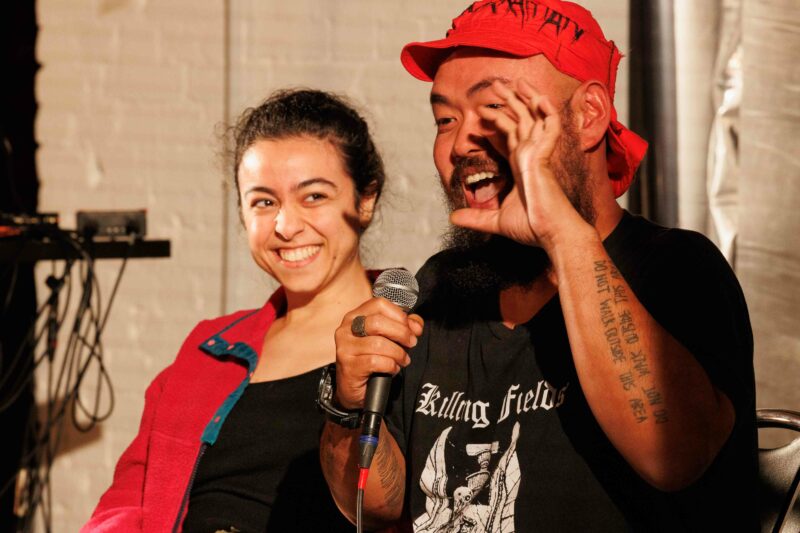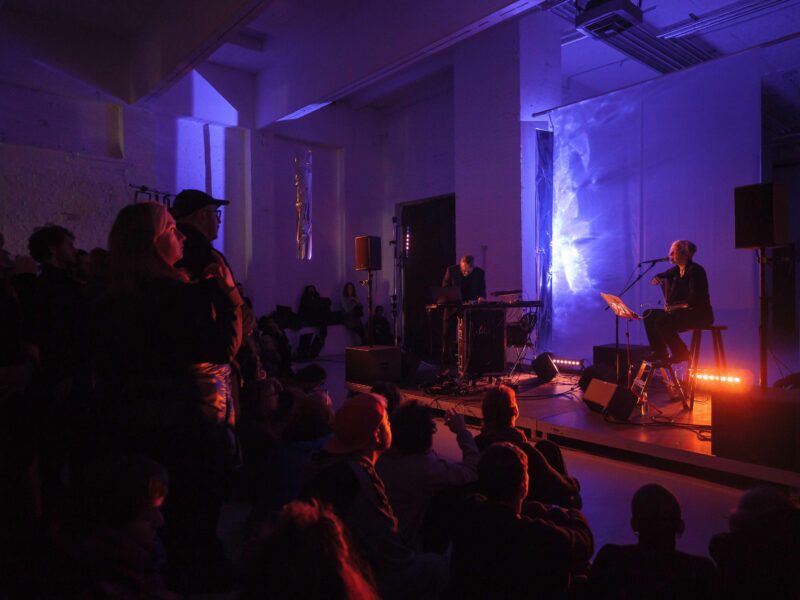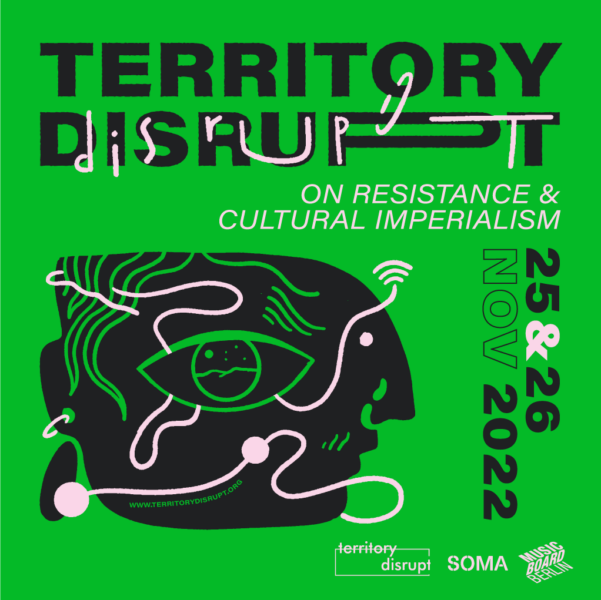Music, and electronic music, perhaps in particular, has always had a political dimension, a resisting force. It became the soundtrack of empowerment for many communities. Since electronic music usually has no or very little lyrics, the political dimension might not be obvious. However, that doesn’t mean it is lacking in power. To understand the meaning of artistic practice in times of war as a tool of resistance, but also as affected by cultural imperialism were the core themes of a two-day event called Territory Disrupt.
“1st voice:
Darkness I stubbed my toe
2nd voice:
Against something
Hard that moved
1st voice:
And walked
Down the road”
(Excerpt from Poem for Three Voices by Umashankar Manthravadi; part of the performance by Bint Mbareh)
The Russian invasion of the Ukraine has made us – and by us I mean Western Europeans–painfully aware of how delusionally we pushed away the narrative of war. February 2022 was the time our democratic-European bubble burst. Those, who had been conscious of the many geopolitical and humanitarian crises understood that this could be a momentum for change or at least to raise awareness. Territory Disrupt was initially a reaction to the war in Ukraine started by Russia. But the organizers recognized that the root of the problem is not particular to the fascist regime of Putin. “When speaking about creating a music event that could reach out to the local sound/music community in Berlin, we quickly realized that the topic shouldn’t only center on Ukraine – and that dialogue is crucially missing between so many regions afflicted by wars caused by imperialism” Taïca and Leil, both part of the curatorial team tell me via email.
“We were very clear from the beginning that we wanted to create a much-needed space for dialogue where artists from various realities directly impacted by war and cultural imperialism can exchange experiences, strategies for resistance, and coping mechanisms.”
The program featured artists and researchers with roots and active ties to countries and regions affected by recent or ongoing wars. They individually shared their practices and stories. The panels, and on a meta level the event as a whole, intended to understand their connections – some discussions more successfully than others – even when the discussed geographical locations and timelines are distant and without suggesting a one-size-fits-all approach. There is a fine line between showing mutual solidarity and comparing multiple perspectives. By sharing their practices and stories individually, artists like Palestine-born and Paris-based singer, musician and composer Kamilya Jurband, Ukrainian duo Clustered Lizard or Thai artist Pisitakun Kuantalaeng all found their place on the stage or podium without hierarchizing the individual political contexts.
“1st voice:
Lost
In the crowd
Of anonymous gestures
2nd voice:
At the end of the candle
The arc thrown
In the wet grass
lost”
Cultural Imperialism and Its Many Dimensions
Imperialistic and colonial practices include strategies to dominate and marginalize the local cultural scene. Music, language, and art are important factors in building communal identity, but are also used to shape, control, and consciously manipulate the narrative of the past, present, and future. Throughout history, oppressors tried to vanish local cultural practices. In a war of narratives, music is one language. It is important to understand who is speaking, who’s voice gets amplified. The general tone of the event was not about preserving traditional practices, but about highlighting continuously overlooked and oppressed narratives.

Bint Mbareh & Pisitakun / Photo by Eunice Maurice
The legitimizing strategy of colonialism – the violent portrayal of people in Asia, Africa, and South America as “inferior” and the construction of a “superior” European or North American self – is still reproduced in today’s human rights discourse (for example through practices of white saviorism). This leads to an ongoing process of cultural imperialism. But uncritical solidarity and Eurocentric perspectives on global justice repeatedly conceal economic and geopolitical interests. A hegemonic human rights discourse, for example, is used as a justification to intervene in African, Asian or South American states. In particular, it is neglected that the origins of European wealth are not (solely) the progress and successes of the European enlightenment, but are decisively rooted in colonialism. The European “helping policy” with reference to human rights must therefore always critically reflect the historical connection between continuing colonial exploitation and normalized European privileges.
Music and art can create a sense of community and can be used to form resistance against these structures. Taking Ukraine as an example, where a new generation of young and creative minds have formed a new identity without any post-Soviet nostalgia. With the annexation of Crimea by Russia in 2014, the idea of a free Ukraine intensified and fought for values like freedom of speech, sexual liberation, celebration of diversity and solidarity. The rich electronic music scene that has been built and strengthened over the past years in the Ukraine might have been a direct reaction to the unsettling events the Ukrainian population had to face, and it might be one of the reasons why the Ukrainian resistance is holding strong.
“1st voice:
Its white smoke trailing
2nd voice:
In the memory of tumbledown grass
1st voice:
We do not give up“
Connecting Through Music
The performing artists exploring sonic fields with individual approaches have been invited based on their musical talent, but also because they have been outspoken about social injustice and wars in their heritage regions and beyond. Their artistic practice is not only well-crafted, but a contribution to current political discourses.
Poly Chain is a DJ born in Ukraine now based in Berlin. During the panel, she described quite beautifully how music is like another language she speaks – fluently I would add. She is able to communicate her stories, even without using lyrics. Compared to her club-ready bangers with rhythmic kicks, her set at Territory Disrupt was more ambient, but equally synth-heavy and melodically complex. Having been a prominent figure in the Ukrainian electronic music scene, she now uses her voice to speak up against the war. Her music translates her unstoppable and fearless attitude that she also verbalizes against the Russian aggression. The audiovisual duo Cluster Lizard, consisting of Kateryna Zavoloka and Dmytro Fedorenko, takes inspirations from science fiction writers and filmmakers, such as the Ukrainian author and human rights activist Oles Berdnyk. In their performance they created an immersive listening experience mixing drifting melodies and synthetic beats into dystopian sound worlds.
Claiming visibility and questioning cultural biases and asymmetries were the overarching topics of the weekend. Khyam Allami presented his generative music software Apotome that questions the hegemony of Western music theory. It facilitates the exploration of microtonal tunings that are common in many non-western cultures, but ignored in most music making softwares. Almost all tools used to make electronic music are based on Western music concepts. And since these tools are not only used in the Western world, this can be seen as a continuation of colonial and imperialistic practices. As Allami said during his talk: “We have to decolonize our ears”.
Something Bint Mbareh is also working on. The sound researcher explores the power of communal singing. She started her sonic journey with her research on rain-summoning in Palestine. A cultural practice of music that connects to communal life in many ways: how to deal with resources, how to connect to seasonal changes and the environment as a whole. To Soma she brought a poem by sound artist Umashankar Manthravadi that was then spoken jointly by the whole audience, creating a warm sense of community. The long established Duo Kamilya Jubran and Werner Hasler intertwine and confront their respective heritages, creating a beautiful example that it doesn’t have to be one or the other. Palestinian singer, composer and oud-lute player Kamilya Jubran, one of the most praised references of the alternative and experimental Arabic music scene and Werner Hasler, Swiss trumpeter, sound researcher and known for interactively played electronic music, each bring in their individual elements without outweighing one another.
For the panels, the artists were joined by researchers, historians and journalists, who each have profound knowledge on the effects of oppression on culture in their home regions and beyond. Amongst them was Ukrainian Berlin-based writer, editor, curator, and co-founder of Borshch magazine Mariana Berezovska, whose writing focuses on the electronic scene in a wider socio-political context. And experimental musician and visual artist Pisitakun Kuantalaeng whose artistic practice has deep political roots. Joined by historian Diana Abbani, researcher Eylaf Bader Edin, with his expertise in cultural studies, language and literature, Hanna Perekhoda, PhD student with a focus on the historical background of Russian-Ukrainian relations, writer and historian of the modern Middle East, Sana Tannoury-Karam and Nino Ugrekhelidze, an intersectional feminist activist. The organizers want to “break the habitual cis-man over-representation on the stage” and to make events more inclusive, for example, through sign-language interpretation during the panels.
Art As A Space of Resistance
Art is used in moments of celebration, mourning, and protesting. All of those were part of the event: From dancing audiences and artists speaking up against fascist regimes and the hypocritical West to a powerful moment of silence for Holodomor Memorial Day, which marks the loss of millions of Ukrainians in the man-made famine of 1932/33. The political dimensions of these performances are evident. But even in less obvious contexts, art has a political power and function. Each movement, from anti-racism, trans-feminism and queer activism to workers’ rights has its own soundtrack. Those songs and sounds are concrete tools for self-determination and empowerment, for cultural preservation, and for coping. Art is not only a companion, but an integral part of the resistance. Or as the organizers put it: „Some expressions are more overt than others, but even the most fantastical or aesthetically-focused projects can have an element of subversion, or humor, or glimpses into other possibilities or potentials. We’re all music lovers and also very political people, so combining this in an event felt natural.“
Both, complex topics and experimental music are not considered to be crowd-pullers. And probably it should not be the goal either. As Khyam Allami briefly explained during the panel when asked, whom his art is made for: He is making the music for himself but everyone is invited to the experience. This translates to the whole event. The aim of Territory Disrupt was curating quality program and contributing to the political and creative discourse, not to fill empty seats or sparsely filled dance floors. But the people that showed up stayed, listened carefully, and participated.
Keeping The Conversation Going
With the Russia’s war on Ukraine, the political dimension of art became even more evident, forming a front of its own. Like in many other regions in the world, resistance became part of everyday life, art, and culture. Many artists had to flee their country and settle elsewhere. The different treatment of people seeking refuge shows again how faulty the system is. For example, when people from the Global South are kicked out of their accommodations to make space for the ones that fled Ukraine, or when looking at the different treatment of BIPoC and white Ukrainians. The artists with various roots are all fighting for freedom and human rights. Territory Disrupt offers visibility and space for their voices and creates room for exchange and connection.
“There is so much power in listening to other realities of people who are facing or have faced similar injustices. Not only in breaking the loneliness and isolation, but also to learn from one another, and build networks of mutual support and solidarity rooted in those shared experiences. We wanted to present Berlin’s music and sound community with a deeper look at the structures of power and oppression, and how they intertwine.”
The organizers have been especially touched by the conversations between the artists that continued far beyond the stage. Exchanges went on “about personal ways of dealing with war, living as a refugee, leaving one’s country, dealing with the intensity of the moments, especially with families and loved ones still under the imminent threat of war, and the impacts this has on their music production.”

Kamilya Jubran & Werner Hasler / Photo by Eunice Maurice
Visions Of Radical Care
After the Russian invasion in February, we have seen many amazing events and initiatives raising money, as well as, artists performing and selling their work to support Ukrainians. We have seen blue and yellow flags popping up everywhere. After this initial wave of support and solidarity from many – that was accompanied by a great deal of missteps and awful reactions by others – it is important to keep that supportive energy up without fetishizing the war and victim narrative. Territory Disrupt is not a charity event. It’s a space for joining forces and to raise awareness. The event managed successfully to open up questions and bring people and topics together that had no direct connection previously.
For anyone who missed the event, or wants to listen back; the recordings of the panels will be available on the Territory Disrupt website. “We certainly enjoyed working together and creating something that seemed to resonate with the public! So we are looking forward to organizing more events, and hopefully Territory Disrupt 2.” And we are looking forward to seeing where the conversation goes.
„Of course, also a shoutout to all the artists worldwide that aim to inspire towards envisioning more open and radically caring ways of being together.“
The project was funded by the Musicboard Berlin and supported by Radical Sounds Latin America, Soydivision, AL Berlin, Cashmere Radio, CTM Festival and Nusasonic and hosted by Soma Art Space.



